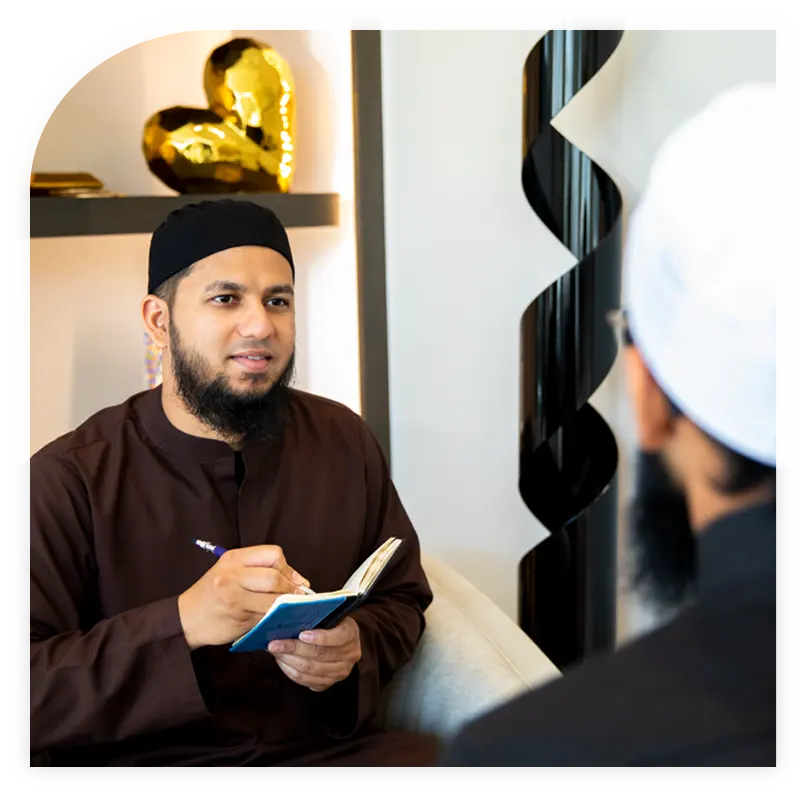Have you ever wondered how to attain a state of tranquility and balance in the fast-paced world while staying true to your Islamic values? Get ready for a life-changing experience as we share the methods for achieving inner harmony via an understanding of Muslim therapy.
This blog looks into the complicated topic of mental health, offering priceless advice and insights. Moreover, it’s helpful for the growing Muslim community, as we show how Muslim therapists support a multicultural Muslim community. Let’s set out on a mission to learn how Muslims can cope with anxiety in Islam that leads to inner peace despite life’s problems.
Understanding Inner Harmony in Islam
Inner peace in Islam is essential, and the Islamic perspective on inner peace lays the foundation for mental well-being. Moreover, understanding inner peace within Islam involves exploring Quranic verses and Hadiths that underscore the significance of a sound mind.
One Quranic verse in Surah Ar-Ra’d (13:28) states,
“الَّذِينَ آمَنُوا وَتَطْمَئِنُّ قُلُوبُهُم بِذِكْرِ اللَّهِ أَلَا بِذِكْرِ اللَّهِ تَطْمَئِنُّ الْقُلُوبُ”
“Indeed, in the remembrance of Allah do hearts find contentment.”
This verse highlights the concept of dhikr (remembrance) to achieve tranquility and mental peace. Remembering Allah is seen as a source of comfort and serenity.
Similarly, Hadiths offer guidance on mental well-being. A hadith from Sahih Muslim emphasizes the value of strength, stating,
“The strong believer is better and more beloved to Allah than the weak believer, while there is good in both.”
This hadith encourages understanding the balance between physical and mental strength in Islamic teachings, promoting a holistic approach to well-being.
Role of Salah (Prayer) in Achieving Mental Well-Being
The role of Salah (Prayer) in achieving mental well-being is stressed in another Quranic verse (2:43), which states,
“وَأَقِيمُوا الصَّلَاةَ وَآتُوا الزَّكَاةَ وَارْكَعُوا مَعَ الرَّاكِعِينَ”
“Establish prayer, and give Zakah, and bow with those who bow [in worship and obedience].”
Connecting Salah as a spiritual practice to mental well-being underscores the holistic nature of Islamic teachings, acknowledging the interplay between physical acts of worship and mental tranquility.
Additionally, facing trials with patience and seeking solace in prayer is encouraged in the Quran. A verse from Surah Al-Baqarah (2:153) advises,
“يَا أَيُّهَا الَّذِينَ آمَنُوا اسْتَعِينُوا بِالصَّبْرِ وَالصَّلَاةِ ۚ إِنَّ اللَّهَ مَعَ الصَّابِرِينَ”
“O you who have believed, seek help through patience and prayer. Indeed, Allah is with the patient.”
This verse reflects on the importance of patience during challenging times, emphasizing the role of prayer in finding strength and resilience.

The Role of a Muslim Therapist
Understanding Cultural Sensitivities:
A critical aspect of the role of an online Muslim therapist involves recognizing the importance of understanding Islamic values and cultural nuances. This understanding ensures that therapy aligns with the religious beliefs and practices of the individual seeking help.
Integration of Islamic Principles in Therapy:
One of the unique advantages of consulting a Muslim therapist lies in integrating Islamic principles into counseling. This approach highlights the therapist’s use of Quranic wisdom to guide coping strategies and resilience-building. For example, drawing on verses from the Quran to provide insights on patience and perseverance during challenging times.
Building Trust and Rapport:
Establishing trust between a therapist and a Muslim client is paramount, and shared cultural backgrounds are crucial. An online therapist, through shared cultural understanding, may be better equipped to comprehend the stigma around mental health in Islamic communities, fostering a more open and trusting dialogue.
Respecting Privacy and Confidentiality:
In tightly-knit communities, concerns related to privacy and confidentiality are heightened. Moreover, they may be more attuned to these concerns, understanding the potential impact on family and community relationships. This sensitivity enables the therapist to address confidentiality issues in a manner that respects the individual’s cultural context.
Incorporating Islamic Mindfulness Techniques:
A Muslim therapist can contribute to mental well-being by introducing mindfulness practices rooted in Islamic traditions. For instance, they may teach clients to engage in mindful reflection and gratitude practices inspired by Islamic teachings. This approach provides a culturally relevant framework for cultivating mindfulness and promoting mental health.
By delving into the Islamic perspective on inner peace and recognizing the unique advantages of consulting a therapist, individuals can navigate the path to mental well-being while staying true to their religious and cultural values.
10 Tips for Inner Harmony and Peace
Connecting with Faith:
The role of spirituality in achieving inner peace is paramount in Islam. Encouraging mindfulness in prayers and fostering a deep connection with Allah is central to this pursuit. By grounding oneself in faith, individuals can find solace and tranquility amid life’s challenges.
Balancing Dunya and Akhirah:
In Islam, the concept of balancing worldly affairs with spiritual responsibilities, Dunya and Akhirah, is emphasized. Maintaining this delicate equilibrium requires conscious effort. Practical tips for achieving this balance include:
- Time management.
- Setting priorities aligned with Islamic values.
Coping Strategies from Islamic Teachings:
Islamic teachings offer valuable coping mechanisms. Emphasizing the importance of patience (Sabr) during hardships and expressing gratitude (Shukr) for blessings are integral to navigating life’s difficulties. Drawing strength from these principles helps individuals cope with adversity with resilience and grace.
Seeking Support in the Muslim Community:
Advocating for community support within the Muslim community is crucial. Seeking advice from elders and community leaders provides strength and wisdom. Community ties serve as a support network, offering understanding and encouragement during challenging times.
Embracing Diverse Therapeutic Approaches:
Promoting openness to various therapeutic methods compatible with Islamic principles is essential. Furthermore, recognizing the compatibility of psychotherapy with Islamic values allows individuals to explore diverse avenues for mental health support. This inclusivity ensures that individuals find therapeutic approaches that align with their religious beliefs.

Mindful Living by Sunnah:
Discussion of Sunnah practices that promote mindfulness is significant. Providing examples of Prophet Muhammad’s (peace be upon him) habits for a peaceful life encourages mindfulness in daily activities. Aligning one’s lifestyle with Sunnah principles contributes to a mindful and purposeful existence.
Online Muslim Therapist: Accessing Support Anywhere:
Introducing the concept of online therapy for the Muslim community acknowledges the evolving nature of mental health support. Emphasizing the convenience and accessibility of seeking help online enables individuals to access therapeutic support from anywhere, maintaining privacy and flexibility.
Addressing Anxiety in Islam:
Delving into the concept of anxiety within the Islamic framework allows for a comprehensive understanding. Offering guidance on managing anxiety through Islamic principles, such as reliance on Allah, regular prayers, and positive affirmations, provides practical strategies for overcoming anxiety.
Tailoring Therapy to Cultural Sensitivities:
Discussing the importance of cultural competence in therapy highlights how online Muslim therapists understand and respect cultural nuances. Tailoring therapy to align with the individual’s cultural context fosters a more effective and empathetic therapeutic relationship.
Self-Care and Mental Well-being in Islam:
Emphasizing the significance of self-care in Islam is crucial. Practical self-care tips aligned with Islamic values encourage individuals to prioritize their mental well-being. This holistic approach promotes a balanced and fulfilling life through Islamic teachings.
Can Therapy Be Aligned With Islamic Beliefs?
Yes, therapy can be aligned with Islamic beliefs. Islam places a strong emphasis on seeking knowledge, self-improvement, and compassion. When conducted in a manner consistent with Islamic principles, therapy can complement these values.
Therapists can integrate Islamic teachings into their approaches, respecting cultural nuances and religious beliefs. Islamic counseling may involve incorporating Qur’anic principles, Prophetic traditions, and the concept of Tawakkul (reliance on Allah) to address mental health concerns.
How to Find an Online Muslim Therapist?
➡️ Islamic Counseling Organizations: Look for organizations that specialize in Islamic counseling. They often have directories of qualified therapists.
➡️ Online Therapy Platforms: Explore reputable online therapy platforms that offer filters for Muslim therapists. Ensure they respect cultural sensitivities and religious values.
➡️ Local Muslim Community Resources: Consult your local mosque or Islamic center. They may have recommendations or resources for online Muslim therapists.
➡️ Professional Directories: Utilize professional directories, ensuring that therapists are licensed and experienced in online counseling. Cross-reference with Islamic qualifications, if possible.
➡️ Referrals: Seek recommendations from friends, family, or community members who have had positive experiences with online Muslim therapists.

What Does Islam Say About Anxiety?
Islam acknowledges the challenges of life, including anxiety. The Qur’an encourages believers to seek refuge in prayer and remembrance of Allah during distress. Tawakkul (trust in Allah’s plan) is emphasized, promoting resilience in the face of anxiety. Seeking spiritual and practical solutions is encouraged, aligning with Islam’s holistic approach to mental well-being.
Is Online Therapy Effective for Muslims?
Yes, online therapy can be effective for Muslims. It offers accessibility, convenience, and a wide range of therapists, including those with expertise in Islamic counseling. Many Muslims find online therapy suitable, as it allows for confidential and culturally sensitive support from the comfort of their homes. Choosing reputable platforms and qualified therapists who respect and understand Islamic values is crucial.
Are There Specific Prayers for Mental Health in Islam?
While there are no specific prayers exclusively for mental health, various prayers and supplications can be beneficial:
Dua for Ease (Surah Al-Insan 76:25-26): Seek ease in difficulties and challenges.
“رَبَّنَا هَبْ لَنَا مِنْ أَزْوَاجِنَا وَذُرِّيَّاتِنَا قُرَّةَ أَعْيُنٍ وَاجْعَلْنَا لِلْمُتَّقِينَ إِمَامًا”
Dua for Removing Anxiety (Surah Taha 20:25-28): Moses sought relief from anxiety, emphasizing Allah’s ability to remove distress.
“رَبِّ اشْرَحْ لِي صَدْرِي وَيَسِّرْ لِي أَمْرِي وَاحْلُلْ عُقْدَةً مِّن لِّسَانِي يَفْقَهُوا قَوْلِي”
Dua for Protection from Stress and Grief (Surah Al-Baqarah 2:286): Seek refuge from overwhelming stress and grief.
“اللَّهُمَّ لَا تُؤَاخِذْنَا إِن نَّسِينَا أَوْ أَخْطَأْنَا، اللَّهُمَّ وَلَا تَحْمِلْ عَلَيْنَا إِصْرًا كَمَا حَمَلْتَهُ عَلَى الَّذِينَ مِن قَبْلِنَا، اللَّهُمَّ وَلَا تُحَمِّلْنَا مَا لَا طَاقَةَ لَنَا بِهِ، وَاعْفُ عَنَّا، وَاغْفِرْ لَنَا، وَارْحَمْنَا، أَنتَ مَوْلَانَا فَانصُرْنَا عَلَى الْقَوْمِ الْكَافِرِينَ”
Dua for Patience (Surah Al-Baqarah 2:286): Ask for patience during challenging times.
“رَبَّنَا لَا تُؤَاخِذْنَا إِن نَّسِينَا أَوْ أَخْطَأْنَا، رَبَّنَا وَلَا تَحْمِلْ عَلَيْنَا إِصْرًا كَمَا حَمَلْتَهُ عَلَى الَّذِينَ مِن قَبْلِنَا، رَبَّنَا وَلَا تُحَمِّلْنَا مَا لَا طَاقَةَ لَنَا بِهِ، وَاعْفُ عَنَّا، وَاغْفِرْ لَنَا، وَارْحَمْنَا، أَنتَ مَوْلَانَا فَانصُرْنَا عَلَى الْقَوْمِ الْكَافِرِينَ”


